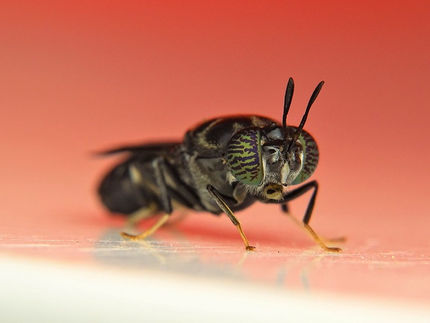More than just insects
Alternative protein sources supplement conventional food and animal feed
Advertisement
Safety, nutritional value and consumer acceptance are the focus of an international conference on the topic organized by the BfR

Symbol image
computer generated picture
Lupins, algae or insects - these and other protein sources are increasingly being developed for the food and animal feed industry, which have not been used or have hardly been used in this country to date. One aim is to ensure the availability and safety of these foods for a growing world population through a sustainable and resource-conserving circular economy. "The introduction of alternative protein sources can lead to new health risks that need to be identified and assessed in good time," says BfR President Professor Andreas Hensel. "The spectrum ranges from allergy risks from insect proteins, microbial risks, risks from contaminants or previously unknown toxins to risks from antinutritive substances." At the international conference "Alternative Proteins for Food and Feed" from December 3 to 5, 2024, experts will discuss the current status of the development of alternative protein sources, how other countries assess health risks and which regulatory issues need to be clarified in connection with these food and feed products.
Animal foods such as meat, eggs, yoghurt and cheese are the traditional sources of protein in the human diet. However, some consumers today want to eat fewer or no animal products and are looking for other sources of protein. The consumption of resources in the production of many animal-based foods is cited as a further reason for using alternative sources of protein. These include plants that were previously not or hardly ever used in the food and animal feed industry, such as legumes like lupins. Animal-based protein sources such as insects or "artificial meat" from animal cell cultures as well as microbially produced protein biomass are also being researched as alternative protein sources.
If foods contain proteins from alternative sources that were not used for human consumption to any significant extent in the European Union before May 15, 1997 and that can be assigned to at least one of the food categories listed in the Novel Food Regulation (EU) 2015/2283, they are considered novel foods in the EU. They undergo a health risk assessment by the European Food Safety Authority (EFSA) as part of the approval process. In the case of insects, which can be added to processed foods such as cookies or pasta in the form of insect flour, for example, particular attention is paid to the risk of allergies. For example, people who are allergic to house dust mites, crustaceans or molluscs (molluscs) are particularly at risk of having an allergic reaction to foods containing insect protein. The BfR has therefore established methods for the detection of insect proteins in highly processed foods and researched the allergenic potential of different insect species.
Another health risk can arise from undesirable substances or contaminants that may be contained in these foods and feedstuffs. For example, it is known that legumes contain antinutrients, such as phytic acid, which inhibit the absorption of important minerals such as iron or zinc. Dried seaweed can contain very high levels of iodine, which can cause hyperthyroidism. Other health risks include contaminants from the environment that accumulate in protein sources, microbiological impurities and toxins (some of which are as yet unknown). Particularly in the case of animal feed, not only the possible effects of alternative protein sources on the health of livestock must be taken into account, but also the so-called "transfer" of substances into food of animal origin. Studies at the BfR have shown, for example, that ingredients from animal feed that pose health problems can be transferred into the milk of cows, such as bitter substances from lupins (alkaloids).
The conference will focus on the current and future use of the new protein sources, regulatory framework conditions and safety tests in various countries, as well as the sustainability and socio-economic aspects of their use. Nutritional aspects and consumer acceptance will also be discussed. The conference is being organized by the BfR in cooperation with the European Food Safety Authority (EFSA), the US Food and Drug Administration (FDA), the Singapore Food Agency (SFA) and the Icelandic Institute of Food and Biotechnology (Matis).
Note: This article has been translated using a computer system without human intervention. LUMITOS offers these automatic translations to present a wider range of current news. Since this article has been translated with automatic translation, it is possible that it contains errors in vocabulary, syntax or grammar. The original article in German can be found here.































































